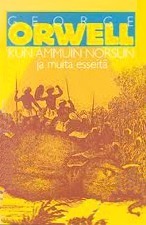What do you think?
Rate this book


285 pages, Paperback
First published January 1, 1936





 Just in case you get the wrong idea, Orwell loved animals. Here he feeds his pet goat Muriel. Maybe he also had an animal farm where he sang "Old MacDonald had a farm. E-I-E-I-O...."
Just in case you get the wrong idea, Orwell loved animals. Here he feeds his pet goat Muriel. Maybe he also had an animal farm where he sang "Old MacDonald had a farm. E-I-E-I-O...."